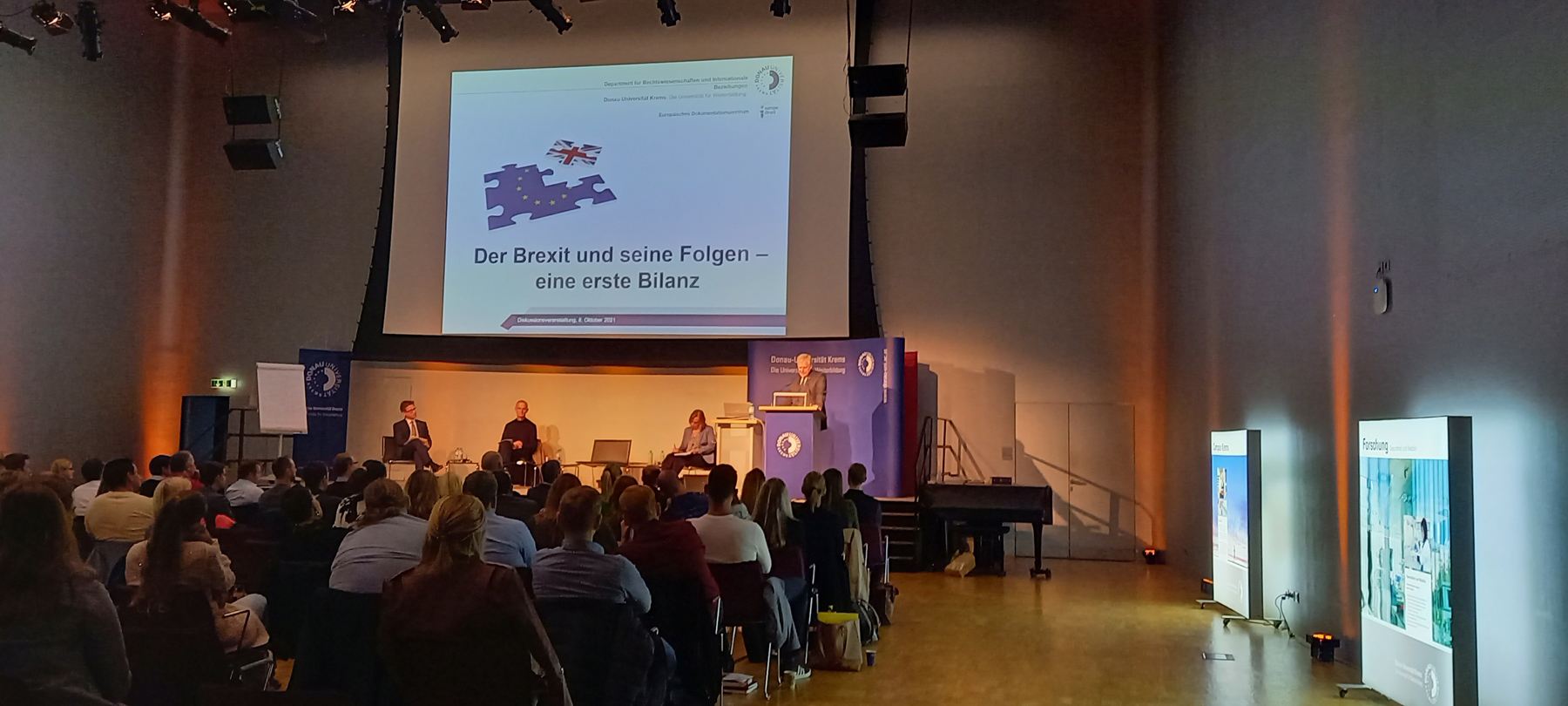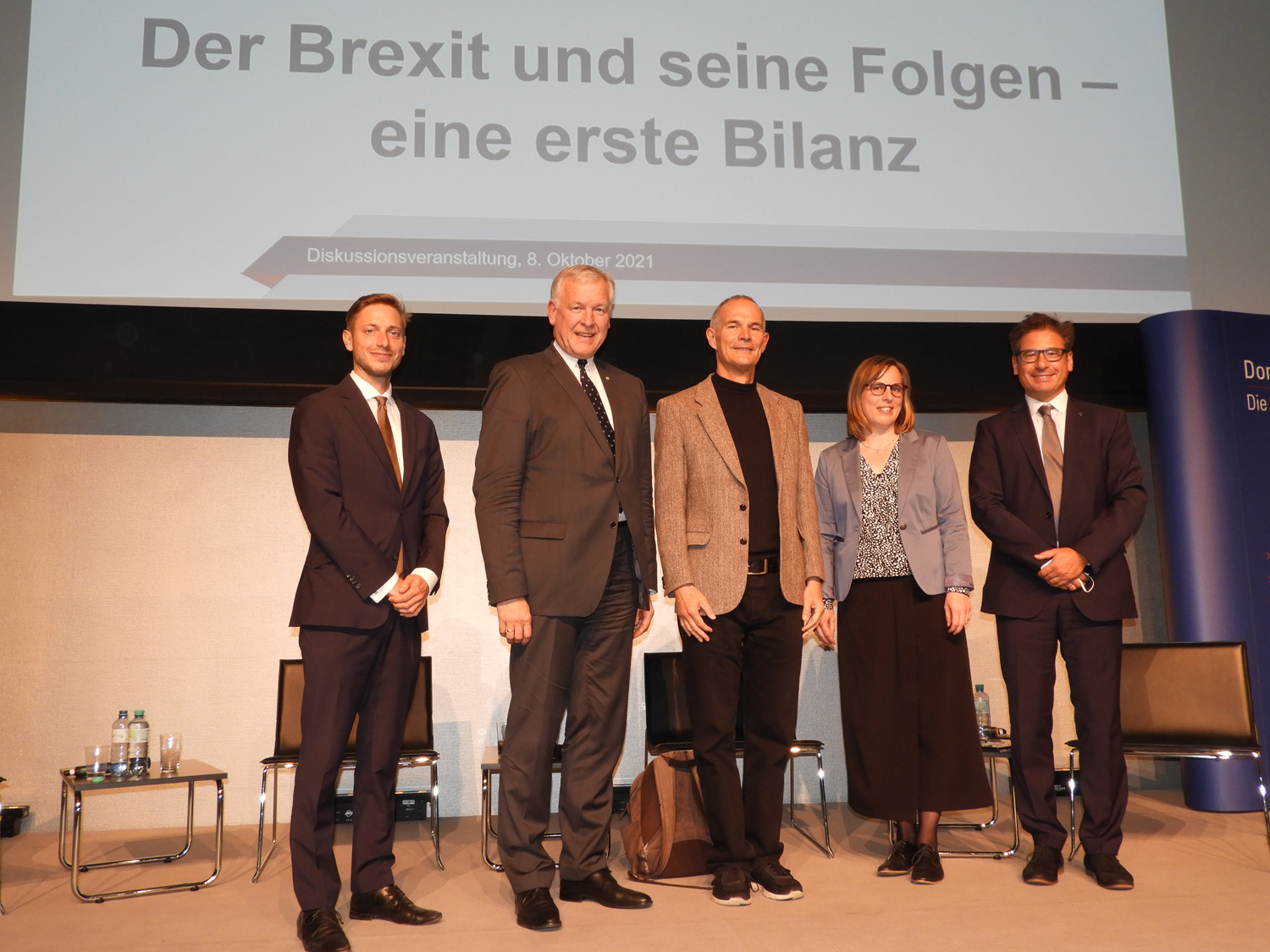The Department for Legal Studies and International Relations at the University for Continuing Education Krems and the Department's European Documentation Center (EDZ) kicked off the new academic year 2021/22 on 8 October 2021, holding the hybrid discussion event "Brexit and its consequences - an initial assessment" for students and interested parties.
20 months after the United Kingdom left the European Union on 31 January 2020 and nine months after it also left the Single Market and the Customs Union with the transition period expiring on 31 December 2020, the event highlighted various Brexit implications for the EU, the United Kingdom as well as Austria. Assistant Prof Gabriel M. Lentner, Deputy Head of the Department and Scientific Director of the European Documentation Center (EDZ), opened the event by referring to the EDZ's partnership agreement with the European Commission which was recently established. The EDZ aims to serve as a bridge between the EU and the university planning to dedicate more time to the public discussion on the EU issues the future will bring.
High-ranking experts from the world of diplomacy and profound experts on the background of Brexit were invited as panel guests: H.E. Leigh Turner, British Ambassador to Austria from 2016 to September 2021, and Landesrat Martin Eichtinger, former Austrian Ambassador to the United Kingdom from 2015 to 2018. Susanne Fraczek, operational director of the EDZ, moderated the panel. First, in their keynote speeches, Ambassador Turner and Provincial Councilor Eichtinger shared their respective findings on the reasons and consequences of Brexit as well as their individual experiences.
Bringing EU decisions closer to the people
The consequential matters of Brexit have been a major subject for Leigh Turner throughout his time as ambassador in Vienna, i.e., the status of British citizens in Austria and of Austrians in the UK or the impact on trade, culture, and education. In his presentation, he explored the factors that led to Brexit, on the one hand pointing to shortcomings in EU decision-making: there is a "tension between decision-makers who think they know what is right for the EU and the people in the member states. Brexit has shown us this," Turner said. On the other hand, he said, there is a fundamentally different view in the U.K. of the value of European integration and of security vs. risk, which was crucial in the 2016 Brexit referendum, alongside social media having an emotionalizing effect.
When assessing the current situation in the UK, different opinions exist as to how this relates to Brexit - there is a strong polarization, but no real debate. Economic growth is still going strong, with forecasts of 6.8 percent for 2021 and 5.5 percent for 2022. However, for Brexit opponents the difficulties and complications caused by the Brexit are already apparent. In Turner's opinion, further countries are unlikely to leave the EU due to the special situation in his country, yet the EU should not evade analyzing the reasons in detail that have led to Brexit.
EU hopes for cooperation with the United Kingdom to continue
Provincial Councilor Martin Eichtinger recalled the challenging exit negotiations between the EU and the United Kingdom. He considers the resulting trade and cooperation agreement to be good, as it allows access to the European single market for goods and services originating in the UK. Generally, Eichtinger hopes the UK will not drift away too much, even though it is now a third country to the EU. Eichtinger agreed with Leigh Turner's reference that the EU needs to set reforms, and that UK's call for efficiency and competitiveness would be missing within the EU.
In his position as ambassador in London, he was also concerned about safeguarding the rights of Austrians in Great Britain and, vice versa, of British citizens in the EU and, more specifically, in Austria. The withdrawal agreement dealt well with this important aspect, he said. „Out of the approximately 35,000 Austrian citizens in the UK, 23,000 had acquired settled status by this summer. This means for the rest of their lives they are legally equal with British citizens," said Eichtinger.
Many legal questions remain unanswered
Prof Thomas Ratka, Head of the Department for Legal Studies, introduced the discussion that followed the keynote speeches. Ratka addressed the UK's withdrawal from the Erasmus program which had a bitter effect on the universities and their students. After all, the boost the U.K.’s image gains from students who have studied in the U.K. to subsequently bring their positive experiences to the world "can't be measured in terms of money," Ratka said, alluding to the U.K. government's argument about cost. Eichtinger and Turner also regretted the UK's withdrawal from the Erasmus program.
Furthermore, Ratka, an expert in corporate law, underlined some deficits in the trade and cooperation agreement: the status of Gibraltar and the validity of the fundamental freedoms. The much-criticized Northern Ireland Protocol was raised as an extremely important outstanding issue. Ambassador Turner emphasized that it is in the interest of Great Britain, Ireland, and the EU not to establish a hard border on the island of Ireland.
Numerous questions came from the audience on the division of British society, Scotland's autonomy aspirations in the light of Brexit, and the global role of the UK and the EU, which has lost an important member not only of economic but also military weight.




